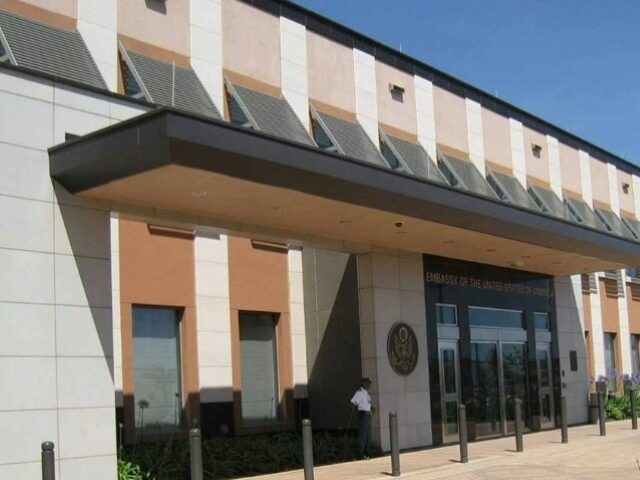Several Afghan refugees living in Madagascar staged a demonstration outside the U.S. Embassy in Antananarivo, the African island nation’s capital, on Monday to protest what they described as stalled efforts by the embassy to process their refugee visa applications, Al Jazeera reported.
“At least a dozen Afghans including both adults and children gathered on Monday outside the embassy premises, saying they had applied for the US Refugee Admissions Program in 2019, but were yet to receive any updates until two months ago, when they had interviews with a US Citizenship and Immigration Services (USCIS) agent,” the Qatari news outlet reported on July 18.
“Those gathered said they had worked in support of either NATO [North Atlantic Treaty Organization] forces or US and foreign companies and non-profits in Afghanistan, and as a result, faced Taliban retribution if they returned to their home country,” Al Jazeera relayed.
The Afghan nationals referred to the U.S.-led War in Afghanistan (2001-2021), which was supported by an international coalition of forces including those associated with NATO. The Taliban, a Sunni Islam-based terror organization, seized control of Kabul, Afghanistan’s seat of government, on August 15, 2021. The Taliban’s takeover of Kabul not only ousted the capital’s U.S.-backed government but also prompted thousands of Afghans to flee the country in subsequent weeks.
Many Afghans feared that the group would reimpose harsh Islamic law, or sharia, on the populace as they did when previously running Kabul’s government from 1996 to 2001. The Taliban confirmed on August 18, 2021, that it planned to reinstate sharia as the basis for Afghanistan’s official law code. This included a ban on women and girls leaving home unchaperoned or uncovered by burqas, which are Islamic garments that completely cover a female’s body, including her face. Sharia also entails the use of corporal punishments, such as chopping off a convicted thief’s hand as a penance for his crime.
Others fled Afghanistan after the Taliban’s takeover in August 2021 due to their association with U.S. or U.S.-allied organizations, which made them targets for fatal retribution by the terror organization.
Al Jazeera spoke to two Afghan refugees in Antananarivo on July 18 who said they or their relatives had supported either U.S.-related agencies or NATO forces in Afghanistan before fleeing the country for Madagascar in 2018. They said they chose Madagascar as their destination because its government grants visas on arrival.
“Bahar, a former IT manager at the Afghan central bank, told Al Jazeera that he had previously worked with the US Agency for International Development (USAID) and his family had provided land and support to US-based NGO Morning Star in their home village of Jegdalek. He fled to Madagascar in 2018 after his mother was killed in a Taliban attack,” the news outlet relayed.
“Another woman who sat in front of the embassy, Bibi Maria, said she fled Afghanistan that same year with her four children after the Taliban killed her husband, who she said was a supplier for US and NATO troops,” according to Al Jazeera.
The media outlet observed on July 18 that there are three paths Afghans may follow to obtain protected refugee status according to U.S. government protocol.
Al Jazeera wrote:
One programme offers special immigrant visas (SIVs) to Afghans who worked directly for the US government or for companies that contracted with the US government, but is notorious for having a difficult bar of entry.
Shortly before the fall of Afghanistan, the US Department of State also announced the Priority 2 (P-2) designation, an extension to the US Refugee Admissions Program. It gives priority to Afghans who do not meet the more stringent SIV criteria, but who worked in support of US and NATO forces, for US media organisations or NGOs, or on US-funded projects.
Afghans living abroad can also apply for humanitarian parole, which grants emergency access to the US. That was what was granted to the 76,000 Afghan citizens evacuated to the US amid the chaotic withdrawal from Afghanistan.
Al Jazeera said on July 18 it reached out to the U.S. Embassy in Madagascar and Comoros for comment on the progress of Afghan refugee visa applications but did not receive a response.
While the Afghans who spoke to Al Jazeera this week said they had escaped Afghanistan in 2018, or three years before the Taliban seized control of Kabul, their delayed journey to securing refugee visas highlights a related phenomenon. According to a July 1 report by CBS News, tens of thousands of Afghans who fled Kabul post-August 2021 continue to wait for the administration of U.S. President Joe Biden to grant them their own protected refugee status.
“Between July 2021 and earlier this month, USCIS received over 46,000 parole applications from Afghans overseas. But as of June 2, it had adjudicated fewer than 5,000 applications and denied 93% of them, CBS News reported earlier this month. More than 40,000 parole requests from Afghans remain unresolved,” according to the news outlet.

COMMENTS
Please let us know if you're having issues with commenting.